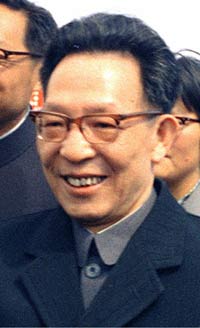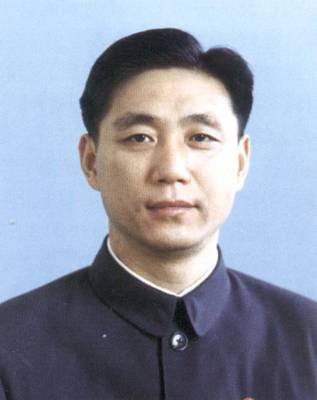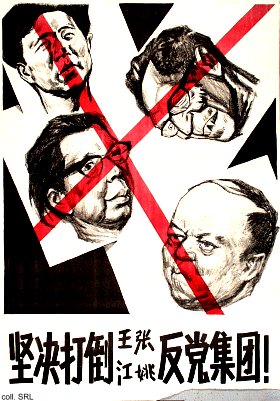<Back to Index>
- Writer and Politician Zhang Chunqiao, 1917
- Vice Chairman of the Central Committee Wang Hongwen, 1935
PAGE SPONSOR

Zhang Chunqiao (1917 Juye County, Heze, Shandong – April 21, 2005) was a prominent Chinese political theorist, writer, and politician. He came to the national spotlight during the late stages of the Cultural Revolution, and was a member of the Maoist radical group dubbed the "Gang of Four".
He worked as a writer in Shanghai in the 1930s. After the Yan'an conference in 1938, he joined the Communist Party of China. With the creation of the People's Republic of China, he became a prominent journalist in Shanghai in charge of the Liberation Daily (Jiefang Ribao). He met Jiang Qing in Shanghai and helped to launch the Cultural Revolution.
Zhang first came to prominence as the result of his October 1958 Jiefang ("Liberation") magazine entitled “Destroy the Ideas of Bourgeois Legal Ownership.” Mao Zedong ordered the reproduction of the article in Renmin Ribao ("People’s Daily"), and personally wrote an accompanying “Editor’s Note” giving mild approval. He was seen as one of Mao Zedong's full supporters as he was starting a struggle with rival leader Liu Shaoqi.
In February 1967 Zhang organized the Shanghai Commune along with Wang Hongwen and Yao Wenyuan, becoming chairman of the city's Revolutionary Committee, encompassing both the posts of city mayor and CPC Committee secretary, until the latter post was restored in 1971. In April 1969 he joined the Politburo of the Central Committee and in 1973 he was promoted to the Standing Committee of the Politburo. In January 1975 he became second deputy Premier, ranking first after Deng Xiaoping was purged again in 1976. His attempt to promote himself higher in the party's hierarchy ended when he was arrested in October 1976. He was sentenced to death, together with Jiang Qing, in 1981, but his sentence was commuted to life imprisonment.
He was released for medical reasons in 1998 and was arranged to live in obscurity back in Shanghai.
Among those calling themselves Maoist outside China, a large portion, perhaps a majority, still uphold the theories of Zhang Chunqiao. His most widely respected article is "On Exercising All - Round Dictatorship over the Bourgeoisie," in which he explained the bases and extent of the problem of the bourgeoisie in China and what would have to be done to prevent capitalist restoration.
In May 2005, it was announced that he had died of cancer the previous month.

Wang Hongwen (born 1935, died August 3, 1992) was the youngest member of the Gang of Four. At the pinnacle of his power he ranked third in the Communist Party hierarchy. He was charged with counterrevolutionary activity in October 1976 and sent to prison.
Wang was born in a village outside of Changchun. He took part in the Korean War in the early 1950s. After the war, he was sent to Shanghai to work in a factory as the head of security guards, where he met Zhang Chunqiao and became involved in a Red Guards group. He organized the Shanghai Commune in January 1967, and in 1969 he was elevated to the CCP Politburo and in 1973 to Vice Chairman and third rank, behind Mao Zedong and Zhou Enlai in the Central Committee Politburo Standing Committee.
Wang was rumored to be slated to become Premier after then - Premier Zhou Enlai's death. However, Hua Guofeng was
chosen to succeed Premier Zhou in January 1976. Wang was an important
player during and after the death of Chairman Mao Zedong, and was the
announcer for his funeral service on national radio on September 18,
1976. He was arrested for his participation in the Gang of Four in
October 1976, tried, and received life imprisonment. He died of liver cancer in a Beijing hospital on August 3, 1992.
